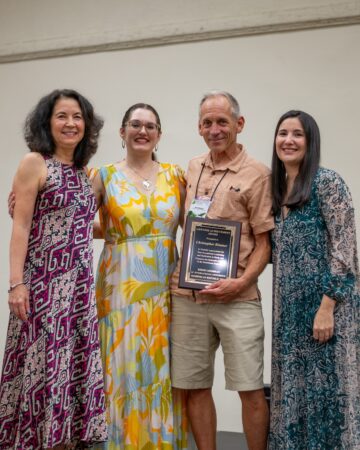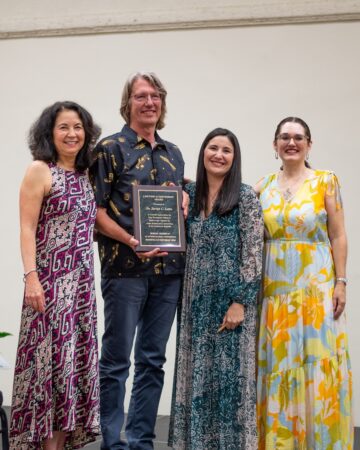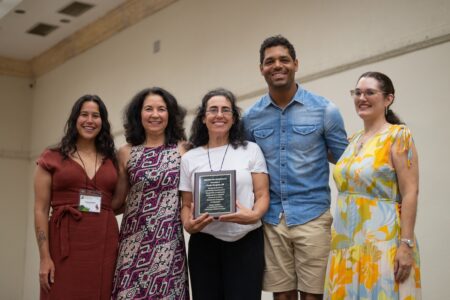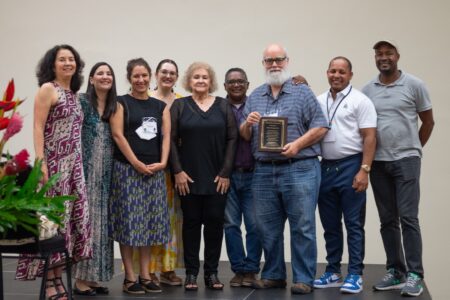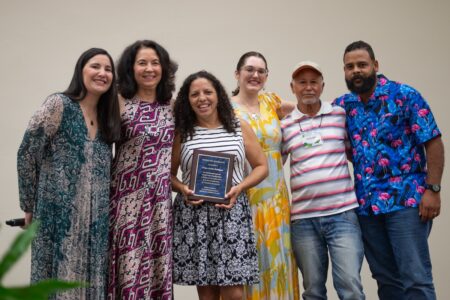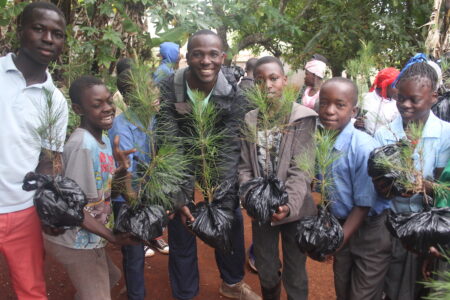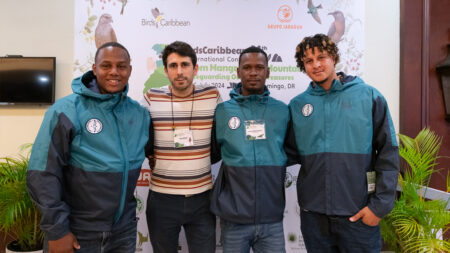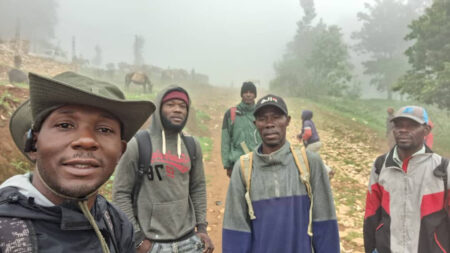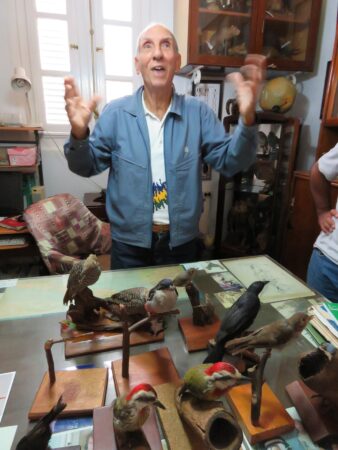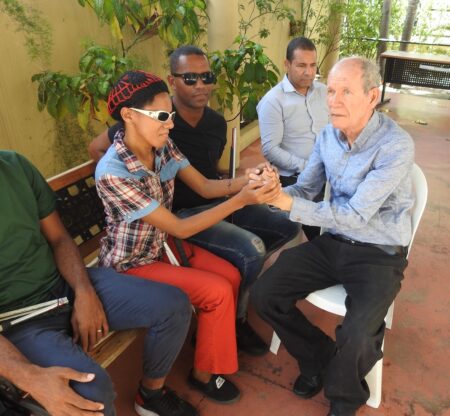Conservation is not an easy calling. Biodiversity protection is a complex undertaking that requires a myriad of interventions: sometimes education and awareness raising, sometimes capacity building, sometimes difficult and tiring fieldwork for us to learn more about how to protect species, sometimes navigating complex networks of stakeholders and laws — always, it requires a special kind of dogged persistence. Work often demands long hours, exhausting days in the field, and battling against entrenched systems and beliefs. Despite the challenging nature of this work, our community consistently goes above and beyond in service of a stronger, beautifully biodiverse Caribbean.
On the final night of every BirdsCaribbean conference, we set aside the evening to recognize and celebrate those in our community who truly embody the tenets of dedication and tireless passion in pursuit of the conservation of Caribbean birds and their habitats. The Awards Ceremony is not only a ritual, but an important moment to show support for our amazing colleagues. We are proud to honor our phenomenal community members who not only advance conservation in our region, but who inspire us to keep pushing harder every day.
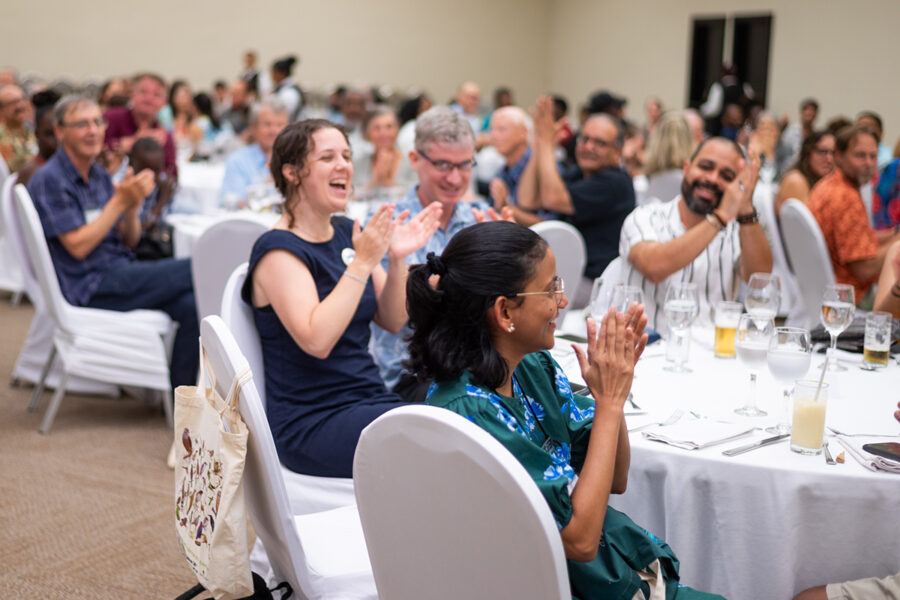
And the award goes to…!!!
LIFETIME ACHIEVEMENT AWARD
The BirdsCaribbean Lifetime Achievement Awards is our most prestigious award, conferred upon those remarkable individuals in our BirdsCaribbean family who have helped change the future for Caribbean birds and their habitats for the better through a lifetime of work and dedication.
We honored two individuals with the Lifetime Achievement Award for their tireless commitment to the study and protection of Caribbean birds and their habitats.
(1) Christopher Rimmer, Emeritus Executive Director of Vermont Center for Ecostudies (VCE), was recognized for his unwavering dedication to the Bicknell’s Thrush, a bird that “connects two worlds”, and for fostering conservation capacity throughout the Caribbean. As a co-founder of VCE, Chris has championed wildlife conservation over the past 3+ decades, blending ecological research with community engagement. Much of his career has been focused on studying the Bicknell’s Thrush across its full life cycle, from the breeding sites in New York and New England to the cloud forests of Hispaniola and Cuba. In 2007, Chris co-founded the International Bicknell’s Thrush Conservation Group (IBTCG), which completed the first-ever Bicknell’s Thrush conservation action plan, a collaborative effort of all six countries across the species’ full annual cycle. Beyond his fieldwork, Chris has also been a dedicated mentor to dozens of young biologists, many of whom have gone on to careers in ornithology and conservation — a testament to his belief that conservation is as much about people as it is ecology. Among his many contributions, we especially honor Chris for his continued support to science, local-based conservation, and capacity building, particularly in the Dominican Republic.
(2) Dr. Steven C. Latta, Director of Conservation and Field Research at the National Aviary, was celebrated for his extensive contributions to Caribbean and Latin American ornithology over the past 25 years. His research has explored the winter ecology of migratory birds, examining how species adapt to both natural and human-induced changes in their habitats. Using the Louisiana Waterthrush as a focal species, he has studied population dynamics and the effects of water quality on bird health. Steve has coordinated some of the longest bird monitoring programs in Latin America, and co-founded the Ruta Barrancolí, the first national birding trail in the region. His work is distinguished by strong local collaboration, partnering with Dominican biologists and naturalists as collaborators in field efforts, and by innovative efforts with locally-based educators to build a culture of bird conservation among children and adults across the island. He has authored multiple books on Hispaniola’s avifauna, published over 175 research articles, and continues to dedicate himself to mentoring the next generation of conservationists in field research and avian monitoring techniques.
PRESIDENT’S AWARD
President’s Awards recipients are hand selected by by our President Dr Adrianne Tossas, who takes into account multiple factors, such as their capacity to adapt in difficult circumstances and excel in their abilities, ultimately raising the level of service in conservation. This year, four organizations were honored with the President’s Award: The Peregrine Fund Dominican Republic, Grupo Jaragua, Grupo Acción Ecológica and Action pour la Sauvegarde de l’Écologie en Haïti.
(1) The Peregrine Fund Dominican Republic, led by Carlos Suarez and Marta Curti, along with former members Christine and Thomas Hayes, and many other technicians and active community members such as Juan Gavilán and many more, were celebrated for their devotion to the conservation of Ridgeway’s Hawk through effective community engagement and fostering partnerships with the private and public sector. The Peregrine Fund’s Ridgway’s Hawk conservation project, launched in 2002, and has made significant strides in protecting this critically endangered species. A key achievement is their advances in preventing botfly infestations in nestlings, a major threat that could otherwise cause over 70% mortality. The Peregrine Fund has also successes with their Assisted Dispersal Program, which releases young hawks from Los Haitises National Park to the Ojos Indígenas Reserve, establishing new breeding pairs and fledging young in the wild. Partnerships with private organizations have helped retrofit hazardous power lines, reducing the risk of electrocution for Ridgway’s Hawks and other bird species. The Peregrine Fund’s wholistic approach to conservation goes beyond wildlife protection, incorporating community development and environmental education that benefits local people through training, educational programs, and employment opportunities, all while improving the hawk’s conservation outlook.
(2) Grupo Jaragua, led by Sixto J. Inchaustegui, Yvonne Arias, and Yolanda León, along with many other staff and members, were honored for their dedication to advocacy for threatened species and ecosystems, and for their work towards ensuring the conservation of the Dominican Republic’s protected areas. Grupo Jaragua is a leading force in conserving the biodiversity and natural resources of Hispaniola, working across the Dominican Republic and Haiti through initiatives that combine scientific research, community involvement, and sustainable development. Their programs have achieved tangible conservation outcomes for endangered species such as the Ricord’s Rock Iguana, Hawksbill Turtle, and many other wildlife. Their efforts extend beyond fieldwork, playing a pivotal role in shaping environmental policy in the Dominican Republic, including advising the Ministry of Environment and Natural Resources of the Dominican Republic on the expansion of protected areas, the UNESCO nomination of the Jaragua–Bahoruco–Enriquillo Biosphere Reserve, and the establishment of Ramsar wetlands and specially protected areas under the Cartagena Convention. In the field, they partner with local communities, building skills and empowering residents as key contributors to conservation. Many community members have become experts in techniques such as GPS navigation and camera trapping, enhancing the impact of their work, and ensuring that conservation knowledge is deeply rooted in the region.
(3) Grupo Acción Ecológica (GAE), led by Maria Paulino, along with Danilo Mejia and Luis Paulino, were recognized for their efforts to monitor and conserve wetland birds and raise awareness about their threats. GAE, a Dominican nonprofit founded in 2009, is dedicated to protecting biodiversity through field research and community education, operating under the inspiring motto, “For the birds, the environment, and you.” Partnering with the National Aviary in Pittsburgh, GAE has contributed to groundbreaking discoveries about the Louisiana Waterthrush’s annual cycle, highlighting the crucial link between water quality, biodiversity, and human health. As a leader in the Caribbean Waterbird Census (CWC), GAE has played a vital role in surveying key wetlands across the DR, including the Monte Cristi wetlands, now recognized as a migration hotspot for shorebirds. GAE has also been instrumental in fostering a love for birds and nature, hosting the long-running “Campamento Barrancolí” children’s camp in Duarte Province and spearheading celebrations for the Caribbean Endemic Bird Festival and Migratory Bird Day at the National Zoo in Santo Domingo. These initiatives have reached thousands of children and families, making a lasting impact. More recently, GAE has become a key force behind the government’s “Rescate Rosado” initiative, focusing on the rescue, rehabilitation, and monitoring of the American Flamingo. Thanks to GAE’s efforts, hundreds of flamingo traps have been removed, and their data collection is directly influencing conservation strategies and decisions.
(4) Action pour la Sauvegarde de l’Écologie en Haïti (ACSEH), founded by conservation leader Anderson Jean was recognized for their exemplary efforts in building capacity for avian monitoring, conservation, and education in Haiti. This grassroots organization, founded in 2017, has established itself as a leading advocate for the country’s environment, and works towards “taking action to save Haitian ecology.” ACSEH works along with international partners such as Environmental Protection in the Caribbean (EPIC) and the Grupo Jaragua DR Petrel Monitoring Team to advance the conservation of the Endangered Black-capped Petrel (Diablotin) in several localities in Haiti. This group has pioneered innovative education initiatives, such as the annual Diablotin Festival, celebrated amongst schoolchildren and farmers in Boukan Chat and surrounding areas. In 2019, ACSEH discovered a small population of the Critically Endangered Ridgway’s Hawk on Petite Cayemite Island and is presently working to gather key data to understand the status of this species in a new locality.
FOUNDERS’ AWARD
Established in 2011 at our conference in Freeport, Grand Bahama, the Founders’ Award is given to the student who presents the best paper in conservation research or management research at our conference. The paper must present a scientific research project, the results from which directly apply to management of bird populations, their habitats, or related critical natural resources in the Caribbean Region.
This year, we were proud to present the Founder’s Award to Andrea Thomen for her paper “Endemic Parrot Trade in Dominican Republic: Implications for Conservation and Management.” Her groundbreaking research into the domestic parrot trade revealed the extent and geographical spread of parrot ownership in the Dominican Republic through a nationwide survey.
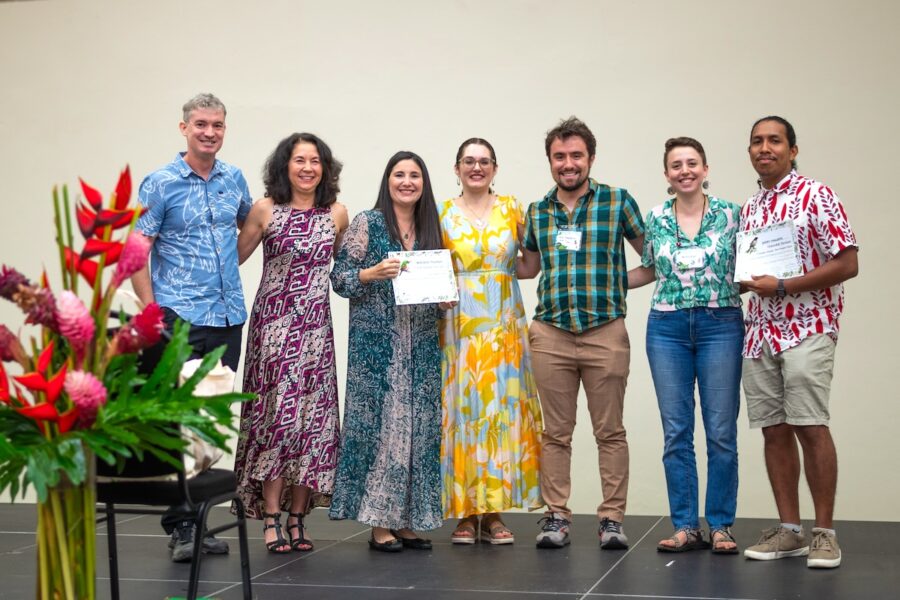
Other delegates were commended for their exceptional aptitude for research and oral presentations too. Honorable mention goes to Garry Auguiste (Dominica) for his paper “Quantifying the Population Density and Distribution of Amazona Parrots of the island of Dominica, Post-Hurricane Maria”, Michelle Moyer (USA) for her paper “Investigating Male and Female Vocalizations of an Understudied Caribbean Endemic Bird”, and Kyle Kittelberger for his paper “Evaluating Extinction Risk Among Resident Bird Species on Islands.”
EDUCATOR AWARDS
With a powerful mix of passion, innovative approaches, and a flair for the creative, educators drive awareness and nurture change in their communities by introducing birders of all ages to the world of avian conservation. Our Educator Awards are given jointly with our partner, Environment for the Americas, to organizations and individuals that have truly excelled as educators in their communities. With great enthusiasm and energy, these persons have consistently organized fun and exciting community activities for both the Caribbean Endemic Bird Festival and World Migratory Bird Day.
Educator Awards were given to BirdLife Jamaica, SCIENCE (St Vincent and the Grenadines), Les Fruits de Mer (St Martin), Yaritza Bobonis (Fundación Amigos de El Yunque, Puerto Rico), Giselle Ragoonanan (Trinidad and Tobago Bird Observatory and Research Centre, Trinidad and Tobago), Daniela Ventura del Puerto (University of Havana, Cuba) and Simón Guerrero (posthumous award, Universidad Autónoma de Santo Domingo, Dominican Republic). Congratulations to all the winners!
INTERNATIONAL BLACK-CAPPED PETREL CONSERVATION GROUP AWARDS
The only confirmed breeding location of the Endangered Black-capped Petrel, or Diablotin, is the island of Hispaniola, which made it especially fitting for us to use the occasion of our conference to honor the dedicated Dominican and Haitian field teams who have been working tirelessly to advance our understanding of this elusive seabird. Black-capped Petrel nests are notoriously difficult to locate, and even when they are found, navigating the unforgiving highland terrain they nest in is challenging. Our understanding of the status of the petrel in recent years has largely been driven by these resolute field teams from the Dominican Republic and Haiti who boldly undertake this daunting work.
To recognize these exemplary teams, the audience were given insight into the logistical, physical and emotional challenges of their field work. All field team members were then awarded Certificates of Achievement and rain-jackets specially designed to make future field expeditions just a bit more comfortable. The names of all members – Haitian and Dominican – were read aloud to honor their remarkable level of stamina and determination in the face of challenging logistics, difficult terrains and adverse weather. It is with the deepest respect and admiration that we acknowledge the magnitude of these teams’ contribution to the world’s scientific understanding and conservation of the Black-capped Petrel.
We are proud to recognize the Haitian Black-capped Petrel field team: Anderson Jean, René Jeune, Samuel Nossirel, Tinio Louis, Renozier Victome, Maxon Fildor, Jephtanie François, Lionel Raymond, Brazil Jonel, Julcene Raymond, and Wilson Aubourg; and the Dominican Republic (Grupo Jaragua) Black-capped Petrel field team: Ernst Rupp, Gerson Feliz, Geny Marcelo Feliz, Juan Pérez Vidal, Juan Pablo Montero, Jairo Issa Matos, Jose Luis Castillo, and Esteban Garrido.
PARTNERS IN FLIGHT AWARD
The Partners in Flight Leadership Award recognizes outstanding individuals and groups across the Americas for their exceptional contributions to the field of landbird conservation. We are delighted to share that our President, Dr Adrianne Tossas, was honored by Partners in Flight for her almost three decades of promoting conservation of bird species in Puerto Rico and throughout the Caribbean region through research, education, and advocacy. Adrianne’s journey has exemplified resilience and adaptability while building an impressive legacy of leadership in conservation. As a founding member of the Puerto Rican Ornithological Society, she initiated and coordinated the Important Bird Areas program in Puerto Rico. A published author, she wrote “Aves de Puerto Rico Para Niños,” making bird conservation accessible to younger audiences. Since becoming an active member of BirdsCaribbean in 1999, Adrianne has served as Director-at-Large, where she initiated the Caribbean Endemic Bird Festival, which is now in its 22nd year. Today, she proudly leads as the President of BirdsCaribbean. Adrianne is also a Professor of Biology at the University of Puerto Rico.
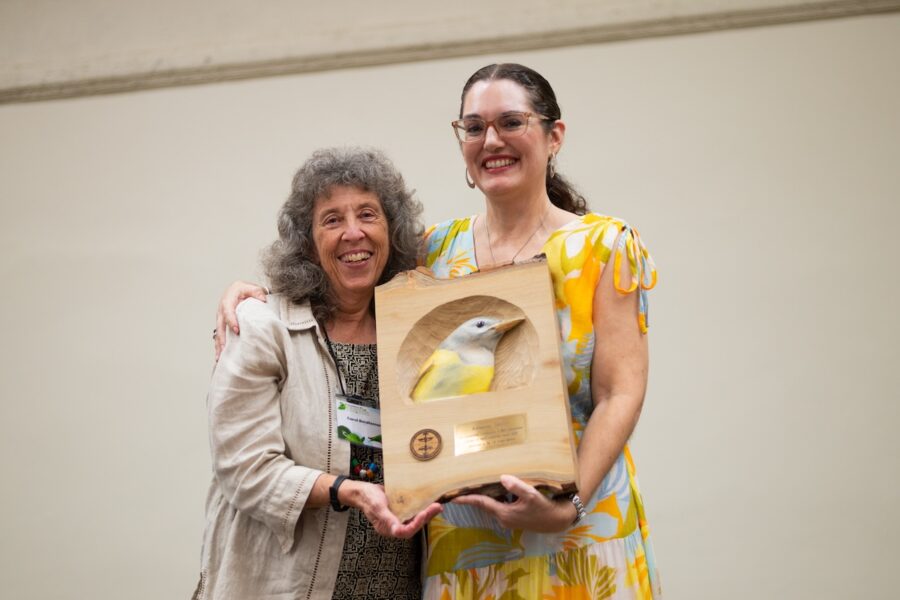
Posthumous AWARDs
This year, we were deeply saddened by the passing of two pillars of our community. Simón Guerrero, and Orlando Garrido continue to stand out as giants among us in their influence and impact, and the contributions that they have each made will advance Caribbean conservation for decades to come. We honored their immense legacies with with Posthumous Awards, and continue to celebrate their memory.
Simón Guerrero, a revered Dominican psychologist, naturalist, and bird behavior expert, left an indelible mark on the conservation community. Serving as a professor for over 40 years at the Autonomous University of Santo Domingo (UASD), he also directed the Experimental Behaviour Lab, inspiring countless students with his engaging teaching style and profound love for nature. Simón’s career extended to the National Natural History Museum in Santo Domingo and the National Zoo-Smithsonian Institute, Washington, D.C. As a founding member of the Society for the Conservation and Study of Caribbean Birds, Simón holds a treasured place in our history; he was a beloved presence at every biennial conference for 30 years, and his absence was deeply felt at this year’s gathering. Simón was a passionate advocate for environmental education, contributing over 300 press articles that promoted conservation in the Dominican Republic. His love for nature went beyond birds to include native flora, encouraging the planting of bird-friendly plants across the country. Known for his quick wit, captivating anecdotes, and heartfelt compassion for animals, he inspired many to become defenders of the natural world. His innovative contributions, such as designing artificial nests for bird species, remain a testament to his ingenuity and dedication. As we honor Simón’s memory, we are guided by the question he often posed: “Does the species know?” His legacy continues to challenge and inspire us to ensure that every conservation effort is felt by the creatures it aims to protect.
Orlando Garrido, celebrated biologist and ornithologist, is remembered as one of Cuban natural sciences most illustrious sons, and as an inspiration to generations of Caribbean naturalists. His legacy includes the discovery of four mammalian taxa and the description of 58 insects, 21 birds, and 37 reptiles. His name is immortalized in the 78 new records among birds, reptiles, and fish, and 23 taxa that have been dedicated to him, and his prolific career produced 298 scientific publications. His spirit of discovery is remembered with respect and awe, oftentimes going out into the field almost “blindly,” armed only with a backpack full of the passion, at a time when there were not yet the field guides of today. He is remembered not only for his scientific achievements but also for his generosity in sharing knowledge, his sharp insights, and his irreverent sense of humor. Orlando’s legend extends beyond science; he was also an internationally recognized tennis player, competing at Wimbledon six times and representing Cuba on the global stage. From dropping out of Biology at university, to becoming the pride of Cuban science, Orlando Garrido’s story is one of remarkable transformation. His life’s work continues to inspire, and we celebrate his memory with deep respect and admiration.

